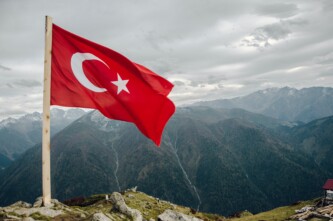Turkey’s central bank has made the decision to raise its main interest rate to 40% in an effort to combat the country’s high inflation. This increase, which is higher than expected, is part of a larger campaign to address the issue of soaring prices. Inflation in Turkey reached 61.36% in October and is projected to continue rising, peaking at around 70 to 75% in May of next year. While central banks around the world have been raising interest rates to combat inflation, President Recep Tayyip Erdogan had previously argued against this approach, claiming that higher rates would lead to further price increases. However, since his re-election in May, his stance has shifted.
Under the leadership of the new central bank chief, Hafize Gaye Erkan, the bank has been given the authority to raise interest rates significantly, from 8.5% to 40%, in an attempt to increase the cost of borrowing and slow down the rate of price increases. The central bank has stated that the pace of monetary tightening will slow down and the tightening cycle will be completed in a short period of time. It has also emphasized that interest rates will remain high for as long as necessary to ensure stable prices.
Turkey’s economy experienced rapid growth during the early years of President Erdogan’s leadership, but has faced challenges in recent years. The central bank’s previous policy of cutting interest rates despite high inflation led to a currency crisis in 2021. As a result, the government implemented a scheme to protect lira deposits from depreciation.
Overall, the decision to raise interest rates to 40% is a significant step towards addressing Turkey’s high inflation. It marks a shift in President Erdogan’s stance on interest rates and reflects a recognition of the need to take action to stabilize prices. The central bank’s new chief has been given the authority to implement these measures, and it is expected that the tightening cycle will be completed in the near future.
Original news source: Turkey’s central bank raises interest rates to 40% (BBC)
Listen
Slow
Normal
Fast
Group or Classroom Activities
Warm-up Activities:
– News Summary
Instructions: Divide the class into small groups. Give each group a copy of the article. Have them read the article and create a concise summary of the main points. Each group can then share their summary with the rest of the class.
– Opinion Poll
Instructions: Prepare a list of questions related to the article, such as “Do you agree with the decision to raise interest rates to combat inflation?” or “Do you think President Erdogan’s change in stance on interest rates is a positive or negative development?” Have the students discuss their opinions in pairs or small groups, and then conduct a class poll to see the overall opinions of the students.
– Sketch It
Instructions: Choose a key event or concept from the article, such as “Turkey’s high inflation” or “President Erdogan’s change in stance on interest rates.” Have each student draw a quick sketch representing that event or concept. Then, have the students share their sketches with a partner or in small groups and explain their drawings.
– Vocabulary Pictionary
Instructions: Select a list of vocabulary words from the article, such as “inflation,” “interest rates,” or “monetary tightening.” Divide the class into teams. One student from each team comes to the front of the class and is given a word to draw on the board without speaking. The rest of their team must guess the word within a time limit. Repeat with different students and words.
– Pros and Cons
Instructions: Divide the class into two groups. One group will discuss the pros of raising interest rates to combat inflation, while the other group will discuss the cons. Give each group time to prepare their arguments, and then have a debate where each side presents their points. Encourage the students to use evidence from the article to support their arguments.
Comprehension Questions:
1. What is the main reason for Turkey’s central bank raising its interest rate to 40%?
2. How does Turkey’s inflation rate compare to other countries?
3. What was President Erdogan’s previous stance on raising interest rates?
4. Who is the new chief of Turkey’s central bank?
5. What is the goal of raising interest rates in Turkey?
6. What were the consequences of the central bank’s previous policy of cutting interest rates?
7. How has President Erdogan’s stance on interest rates changed since his re-election?
8. What is the expected timeline for completing the tightening cycle of interest rates in Turkey?
Go to answers ⇩
Listen and Fill in the Gaps:
Turkey’s (1)______ bank has made the decision to raise its main interest rate to 40% in an effort to combat the country’s high inflation. This increase, which is higher than expected, is part of a larger campaign to address the (2)______ of soaring prices. Inflation in Turkey (3)______ 61.36% in October and is projected to continue rising, (4)______ at around 70 to 75% in May of next year. While central banks around the world have been raising interest rates to combat inflation, President Recep Tayyip Erdogan had previously argued against this approach, claiming that higher rates would lead to (5)______ price increases. However, since his re-election in May, his stance has shifted.
Under the leadership of the new central bank (6)______, Hafize Gaye (7)______, the bank has been given the (8)______ to raise interest rates significantly, from 8.5% to 40%, in an attempt to increase the cost of borrowing and slow down the rate of price increases. The central bank has stated that the pace of monetary tightening will slow down and the tightening cycle will be completed in a (9)______ period of time. It has also emphasized that interest rates will remain high for as long as necessary to ensure stable prices.
Turkey’s economy experienced rapid growth during the early (10)______ of President Erdogan’s leadership, but has (11)______ challenges in recent years. The central bank’s (12)______ policy of cutting interest rates despite high inflation led to a currency crisis in 2021. As a result, the government implemented a scheme to protect lira deposits from depreciation.
Overall, the decision to raise (13)______ rates to 40% is a significant step towards addressing Turkey’s high (14)______. It marks a shift in President Erdogan’s stance on interest rates and reflects a recognition of the need to take action to stabilize (15)______. The central bank’s new chief has been (16)______ the authority to implement these measures, and it is expected that the tightening cycle will be completed in the near future.
Go to answers ⇩
Discussion Questions:
Students can ask a partner these questions, or discuss them as a group.
1. What is inflation and why is it a concern for a country’s economy?
2. How do you think raising interest rates can help combat inflation?
3. How would you feel if the prices of goods and services in your country were increasing at a rapid rate?
4. Do you agree with President Erdogan’s previous stance against raising interest rates? Why or why not?
5. What do you think are the potential risks or consequences of raising interest rates to such a high level?
6. How do you think the decision to raise interest rates to 40% will impact borrowing and lending in Turkey?
7. Do you think other countries should follow Turkey’s example and raise interest rates to combat inflation? Why or why not?
8. How do you think the Turkish people will be affected by the decision to raise interest rates?
9. Have you ever experienced a situation where the prices of goods and services in your country were increasing rapidly? How did it affect you?
10. Do you think the decision to raise interest rates will be effective in stabilizing prices in Turkey? Why or why not?
11. How do you think the decision to raise interest rates will impact foreign investment in Turkey?
12. What measures do you think the government could take, in addition to raising interest rates, to address high inflation?
13. How do you think the decision to raise interest rates will impact the overall economy of Turkey?
14. Do you think the government should have taken action to address high inflation sooner? Why or why not?
15. How do you think the decision to raise interest rates will impact the average citizen of Turkey?
Individual Activities
Vocabulary Meanings:
Match each word to its meaning.
Words:
1. central bank
2. interest rate
3. inflation
4. prices
5. Turkey
6. raise
7. high
8. stable
Meanings:
(a) A large amount or degree of something
(b) The institution that controls a country’s money supply
(c) The percentage charged for borrowing money
(d) To increase or elevate something
(e) A country located in the Middle East and Southeast Europe
(f) Steady or unchanging, not fluctuating or volatile
(g) The amount of money required to purchase goods or services
(h) The general increase in prices over time
Go to answers ⇩
Multiple Choice Questions:
1. Why did Turkey’s central bank raise its main interest rate to 40%?
(a) To combat high inflation
(b) To stimulate economic growth
(c) To attract foreign investment
(d) To decrease borrowing costs
2. What was Turkey’s inflation rate in October?
(a) 40%
(b) 61.36%
(c) 8.5%
(d) 70 to 75%
3. Who is the current president of Turkey?
(a) Hafize Gaye Erkan
(b) None of the above
(c) All of the above
(d) Recep Tayyip Erdogan
4. What was President Erdogan’s previous stance on interest rates?
(a) He supported raising interest rates
(b) He argued against raising interest rates
(c) He had no opinion on interest rates
(d) He wanted interest rates to remain the same
5. Who is the new chief of Turkey’s central bank?
(a) Recep Tayyip Erdogan
(b) None of the above
(c) Hafize Gaye Erkan
(d) All of the above
6. What was the central bank’s previous policy regarding interest rates?
(a) Raising interest rates to combat inflation
(b) Keeping interest rates stable
(c) None of the above
(d) Cutting interest rates despite high inflation
7. What did the government do to protect lira deposits from depreciation?
(a) Raised interest rates
(b) Lowered interest rates
(c) Implemented a scheme
(d) None of the above
8. What does the decision to raise interest rates to 40% reflect?
(a) A recognition of the need to stabilize prices
(b) A desire to stimulate economic growth
(c) A shift in President Erdogan’s stance on inflation
(d) None of the above
Go to answers ⇩
True or False Questions:
1. The new central bank chief, Hafize Gaye Erkan, has not been given the authority to significantly raise interest rates.
2. Turkey’s central bank has not raised its main interest rate to 40%.
3. Turkey’s economy has not faced challenges in recent years, including a currency crisis in 2021.
4. President Recep Tayyip Erdogan had previously argued against raising interest rates but has changed his stance since his re-election in May.
5. The decision to raise interest rates to 40% reflects a recognition of the need to stabilize prices and marks a significant shift in President Erdogan’s stance on interest rates.
6. The central bank has stated that the pace of monetary tightening will slow down and the tightening cycle will be completed soon.
7. The increase in interest rates is not part of a larger campaign to combat high inflation in the country.
8. Inflation in Turkey reached 61.36% in October and is projected to continue rising.
Go to answers ⇩
Write a Summary:
Write a summary of this news article in two sentences.
Check your writing now with the best free AI for English writing!
Writing Questions:
Answer the following questions. Write as much as you can for each answer.
Check your answers with our free English writing assistant!
1. What is the current inflation rate in Turkey and what is it projected to reach in May of next year?
2. What was President Erdogan’s previous stance on raising interest rates and how has it changed since his re-election?
3. What is the purpose of raising interest rates in Turkey and how does it relate to the issue of inflation?
4. What challenges has Turkey’s economy faced in recent years and how did the central bank’s previous policy contribute to a currency crisis?
5. How significant is the decision to raise interest rates to 40% and what does it reflect about the government’s approach to stabilizing prices?
Answers
Comprehension Question Answers:
1. The main reason for Turkey’s central bank raising its interest rate to 40% is to combat the country’s high inflation.
2. Turkey’s inflation rate is higher than other countries, reaching 61.36% in October.
3. President Erdogan had previously argued against raising interest rates, claiming that higher rates would lead to further price increases.
4. The new chief of Turkey’s central bank is Hafize Gaye Erkan.
5. The goal of raising interest rates in Turkey is to increase the cost of borrowing and slow down the rate of price increases.
6. The consequences of the central bank’s previous policy of cutting interest rates were a currency crisis in 2021.
7. President Erdogan’s stance on interest rates has changed since his re-election, and he now supports raising interest rates.
8. The expected timeline for completing the tightening cycle of interest rates in Turkey is in the near future.
Go back to questions ⇧
Listen and Fill in the Gaps Answers:
(1) central
(2) issue
(3) reached
(4) peaking
(5) further
(6) chief
(7) Erkan
(8) authority
(9) short
(10) years
(11) faced
(12) previous
(13) interest
(14) inflation
(15) prices
(16) given
Go back to questions ⇧
Vocabulary Meanings Answers:
1. central bank
Answer: (b) The institution that controls a country’s money supply
2. interest rate
Answer: (c) The percentage charged for borrowing money
3. inflation
Answer: (h) The general increase in prices over time
4. prices
Answer: (g) The amount of money required to purchase goods or services
5. Turkey
Answer: (e) A country located in the Middle East and Southeast Europe
6. raise
Answer: (d) To increase or elevate something
7. high
Answer: (a) A large amount or degree of something
8. stable
Answer: (f) Steady or unchanging, not fluctuating or volatile
Go back to questions ⇧
Multiple Choice Answers:
1. Why did Turkey’s central bank raise its main interest rate to 40%?
Answer: (a) To combat high inflation
2. What was Turkey’s inflation rate in October?
Answer: (b) 61.36%
3. Who is the current president of Turkey?
Answer: (d) Recep Tayyip Erdogan
4. What was President Erdogan’s previous stance on interest rates?
Answer: (b) He argued against raising interest rates
5. Who is the new chief of Turkey’s central bank?
Answer: (c) Hafize Gaye Erkan
6. What was the central bank’s previous policy regarding interest rates?
Answer: (d) Cutting interest rates despite high inflation
7. What did the government do to protect lira deposits from depreciation?
Answer: (c) Implemented a scheme
8. What does the decision to raise interest rates to 40% reflect?
Answer: (a) A recognition of the need to stabilize prices
Go back to questions ⇧
True or False Answers:
1. The new central bank chief, Hafize Gaye Erkan, has not been given the authority to significantly raise interest rates. (Answer: False)
2. Turkey’s central bank has not raised its main interest rate to 40%. (Answer: False)
3. Turkey’s economy has not faced challenges in recent years, including a currency crisis in 2021. (Answer: False)
4. President Recep Tayyip Erdogan had previously argued against raising interest rates but has changed his stance since his re-election in May. (Answer: True)
5. The decision to raise interest rates to 40% reflects a recognition of the need to stabilize prices and marks a significant shift in President Erdogan’s stance on interest rates. (Answer: True)
6. The central bank has stated that the pace of monetary tightening will slow down and the tightening cycle will be completed soon. (Answer: True)
7. The increase in interest rates is not part of a larger campaign to combat high inflation in the country. (Answer: False)
8. Inflation in Turkey reached 61.36% in October and is projected to continue rising. (Answer: True)
Go back to questions ⇧















